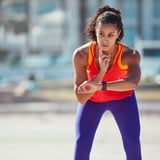dimanche 10 mars 2019
Why This Cardiologist Doesn't Track Heart Rate - and Says You Don't Need to, Either

The rise of fitness trackers and classes that use them have changed the game in the fitness world, making us more aware of how much we move, sleep, stand, and walk. And many new trackers, from Fitbits to Apple Watches, have added a new feature: a heart rate monitor, which lets you track your resting heart rate, check out how high it goes during exercise, and watch how it changes over time as you get more fit.
Those stats are interesting, but we wanted to know how useful heart rate information actually is, especially during a workout. POPSUGAR talked to Ethan Weiss, MD, a cardiologist and associate professor at UC San Francisco, and what he had to say was surprising. "I don't recommend anyone really check their heart rate or follow it for anything other than curiosity," Dr. Weiss said. That's because heart rate can be pretty arbitrary, he says, and can differ greatly between people depending on fitness level. Unless you have a heart condition, you're fine ignoring those numbers, and you might even be better off.
Why Tracking Your Heart Rate Isn't That Useful
One thing that heart rate is closely connected to is your fitness level. "There is a strong correlation between how fit you are and how much your heart rate responds to exercise," Dr. Weiss said. He acknowledged that it can be interesting to watch your heart rate adapt as you get more fit but that it still isn't ultimately that useful.
Related: A Cardiologist Tells Us the Worst Thing For Heart Health
As an example, Dr. Weiss said, "Let's say I did a workout and my heart rate went from, say, 60 to 120 beats per minute in four minutes. Then, if I got myself in shape, maybe that would change to be 60 to 100 beats per minute in 20 minutes." You're increasing your stamina and cardiovascular fitness, so your heart doesn't have to work quite as hard during these tough workouts. That's interesting to know, he said, "but again, there's nothing actionable about that. It's more of a curiosity." In general, there are more useful things to pay attention to.
What You Should Track During Workouts
Dr. Weiss said that he doesn't track his heart rate, not during exercise or rest. "I encourage people to pay more attention to how they feel and to listen to their bodies," he said. "If your body tells you this is too much, don't push to the point of being exhausted." This holds especially true for people who are just starting to get in shape; he said monitoring your heart rate that closely can be a distraction more than anything, drawing you away from your body's natural exhaustion cues.
It can be hard to pick up on those, too, so really pay attention to your body's reactions and fatigue level the next time you're working out. It can be helpful to track or even write down those sensations as a way to gauge your rate of perceived exhaustion (RPE). Here's a chart with some helpful cues to get you started, like noticing how fast you're breathing and whether or not you could hold a conversation.
Related: Here's How Trainers Suggest You Start Working Out If You Find Cardio Intimidating
The main takeaway here is that unless you have a heart condition, you shouldn't stress too much over your heart rate. For the most part, your body can tell you all you need to know: when you're pushing too hard, when you're comfortable, and when you can take things up a notch. Use your fitness tracker to follow other metrics, like steps, stairs, or weight, and let your heart do its thing.










0 comments:
Enregistrer un commentaire